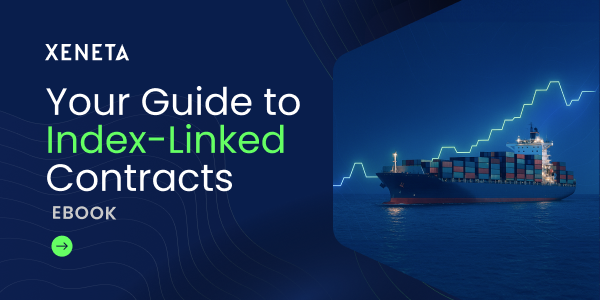
This is part 9 of the Xeneta 11-part FAQ series focusing on key questions related to freight rate benchmarking and procurement. The series provides answers to the most frequently asked questions revolving around the complex world of ocean freight rate benchmarking and procurement. It provides you some tips and tricks to make the process a little less painful.
Part 1: When is the Best Time to Negotiate Ocean Freight Rates?
Part 2: Will I Leave Money on the Table with 12-month Fixed Rates?
Part 3: Should I Agree to Prices “Subject to GRI” or “Subject to Peak Season Surcharge”?
Part 4: How do Alliances Affect my Rates and Service Contract with a Carrier?
Part 5: Should I Choose a Carrier Based on Trade lane or Based on Combined Volume?
Part 6: Should I Benchmark my Shipping Freight Rates Against the Competition?
Part 7: What are the best Practices in Freight Contract Negotiation?
Part 8: What if my Volume Decreases or Increases During my Contract Period?

There are a few pros and cons to going short term, but it’s more a matter of whether you ‘can’ leverage a short-term market or not. And, you have to consider all, both from organizational and operational point of views.
Moreover, the definition of short-term is also subjective. To shippers who are used to long-term tenders of 2 years or over, short-term might be 6-12 months. But to others who are used to negotiating rates every quarter or twice a year, short term might be a 30-day rate validity. For shipping lines, short-term could mean a month or less. In some extreme markets it can be bi-weekly, weekly or even daily.

How Carriers React to Market Rates
Carriers are always watching the market. If they see the short term market rates moving upwards, they may capitalize on the same by pushing for more long-term contracts on a higher price. In a day-to-day operation, some carriers choose even to roll cargo that’s on very low long-term contracts.
If short-term market trends downwards carriers will try and secure long-term at a healthy level before the market drops too low..
If at the other end of the spectrum, the short-term market is at a really low level, the carriers will try and cover their losses as best as they can and focus more on long-term deals which they will offer to bigger volume shippers as the smaller volume shippers may be covered under NVOCCs.

Consider This Before Deciding on Short- or Long-Term Rates
Before you decide whether you want to go short-term or not, it is essential to understand both the shipping and your own market you are trading in. Our data reveals that some retail shippers can never move to short term as they are required to hold their cataloged prices for a long period. Other larger volume shippers may not be organizationally rigged to even consider operating in the short term, no matter how beneficial it could be.
If your market and commodity prices are volatile with more of a downward swing in prices and your sales contracts are also of short validity, it is better for you to go short term so that you don’t get stuck with freight rates that could jeopardize your business.
In some cases, there could also be potential to use the short term market for a portion of the total volume or as a temporary measure to secure a tender in a more favorable market both of which indicates to timing it suitably.
But a major con of going short term would be if you have misread the market and there is not much variation in product pricing or ocean freight rates. If you have gone on a short-term basis, it would then mean additional admin work for you to keep negotiating the rates and also the added risk that the lines might increase your rate.
.png)



-1.jpg)

.avif)

